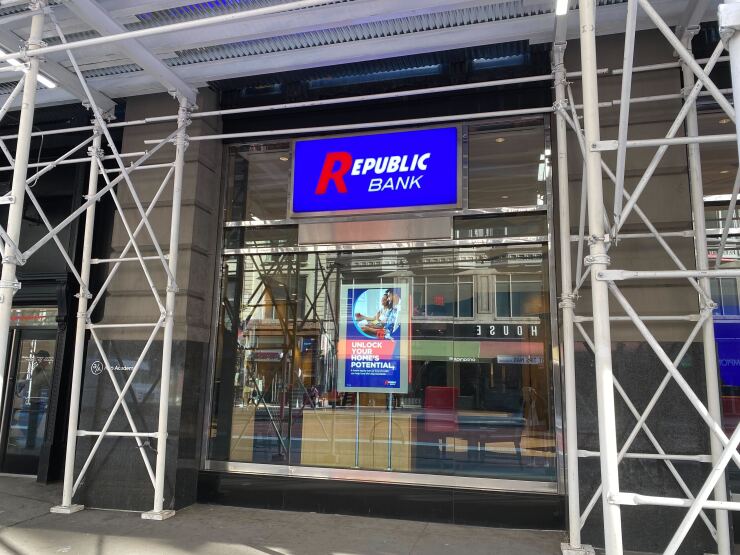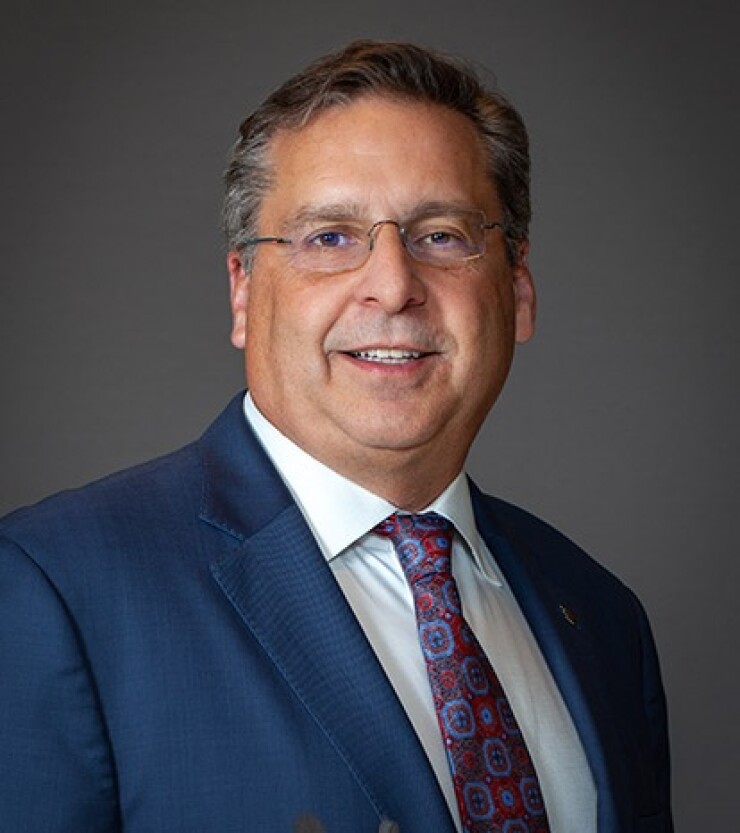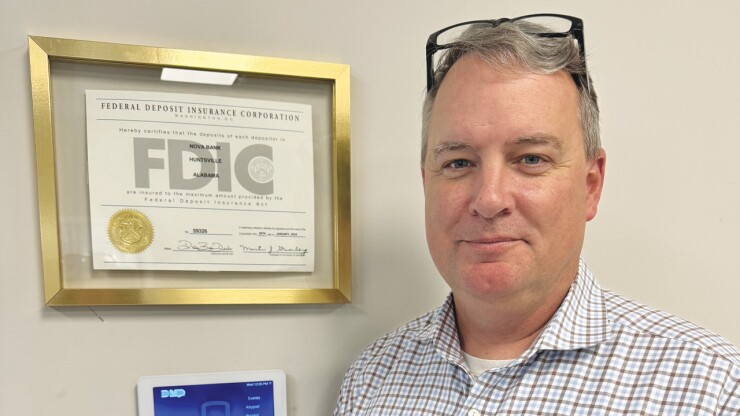
Rowan de Wet
The year 2024 proved to be a busy one for community banks. They struggled to deal with higher interest rates, as well as the lingering effects of the failures that rocked the banking industry in Spring 2023.
There were plenty of high points: an innovative capital transaction for mutual banks; a number of eye-catching deals, as merger-and-acquisition activity began to rebound from a sluggish 2023; near-record activity in SBA’s flagship 7(a) program, especially in the small-dollar space; and continued attention paid to partnerships between banks and fintechs.
Here’s a look back at some of the most interesting stories American Banker covered.

Jenius continues its growth trajectory
Midway through its second year of operations, Jenius Bank appears to be on track.
The digital banking unit of the $5.7 billion-asset SMBC MANUBANK
Jenius produced those results with a relatively slim product set — personal loans and a high-interest savings account. It’s eying a wider array, potentially including credit cards and a checking account, according to President John Rosenfeld.
Rosenfeld, a Desert Storm veteran who served in the active-duty U.S. Army before embarking on a banking career, had a long consumer-banking track record when SMBC Group, SMBC MANUBANK’s Tokyo-based parent company, hired him in 2021. That prior experience came at money-center banks, Bank of America, TD Bank and Citizens Financial, where Rosenfeld was president of the digital-only Citizens Access for nearly four years. Jenius represented an opportunity to build a brand essentially from scratch. SMBC MANUBANK, known then as Manufacturers Bank, was an eight-branch, commercially focused community bank when it launched Jenius.

Michigan’s Sterling finds a buyer after plea deal
Tom O’Brien has built a legendary reputation as a turnaround CEO, but the
The Jacksonville, Florida-based EverBank announced plans to acquire Sterling in September, about 18 months after the seller, whose shareholders approved the deal Dec. 18, pleaded guilty to securities fraud and agreed to pay restitution totaling $27.2 million to non-insider shareholders.
None of O’Brien’s three previous turnaround tours, at Atlantic Bank of New York, State Bank of Long Island and the Vineland, New Jersey-based Sun Bancorp, involved criminal prosecution by the Department of Justice.
With Sterling’s sale set to close in the first quarter, O’Brien’s time at Sterling is nearing a close, though he didn’t shut the door to a new turnaround challenge. “Sometimes you get a call and it’s interesting,” O’Brien said in an October interview with American Banker. “This isn’t the end of the troubled bank world.”

New CEO aims for turnaround at venerable Black bank
The 76-year-old Carver Federal Savings Bank in New York is one of the oldest and best-known Black-operated banks in the country. It’s also one of the most troubled, with a string of losses dating back about a decade.
The job of turning things around belongs to Donald Felix, who
The 50-year-old Felix has a quarter-century of banking experience, all of it at money-center institutions — Citizens Financial, JPMorgan Chase and Citigroup. At Carver, Felix said he intends to raise capital and “attract the next generation of customers” with a robust strategic plan that includes a higher profile in Small Business Administration lending.
Felix joined Carver in the midst of a proxy fight with Dream Chasers Capital, an activist group that made an unsuccessful bid to acquire a controlling stake in Carver earlier this year. Dream Chasers sought to elect two of its members, including CEO Greg Lewis, to board seats at Carver’s annual meeting. Shareholders
“Change is here with Donald Felix,” a source close to Carver told American Banker following the vote.

Chana Schoenberger
Republic First failure followed bitter fight for control
The Pennsylvania Department of Banking and Securities
Republic First’s demise followed more than two years of bitter wrangling for control of the company that involved two shareholder activist groups. Amid the conflict, consumer banking visionary Vernon Hill, who had served as chairman and CEO, was
Amid the struggles, Republic First attempted twice to shore up its financial situation with a capital infusion. The first effort,
Following its failure, Republic First’s assets and deposits were

Modest capital raise offers mutuals a ray of hope
Mutual banking advocates are hopeful a
The $106.7 million-asset Warsaw Federal Savings and Loan Association raised the cash in the form of Tier 1 Capital Instruments, from five bank investors. The key to the deal, announced in September, was that the money counted as Tier 1 capital for regulatory purposes. Similar transactions could give mutual banks an avenue to raise capital other than retained earnings or costlier and shorter duration subordinated debt. The lack of such an option has pushed dozens of depositor-owned banks toward stock conversion, according to mutual advocates.
The 131-year-old Warsaw Federal, which was

VersaBank
Canadian bank’s patience pays off
After waiting for two years, the London, Ontario-based VersaBank
For VersaBank, a niche player focused on purchasing loan and lease receivables from point-of-sale lenders, the deal offers wider access to the significantly bigger U.S. market. VersaBank closed the deal Sept. 3. The new VersaBank USA quickly benefited from a $90 million capital infusion, CEO David Taylor said. The move appeared to telegraph VersaBank’s robust U.S. growth expectations. Indeed, Taylor described VersaBank’s entry into the U.S. as a “transformational event” in a September press release.
For the year ended July 31, VersaBank’s consolidated operation generated about $27.7 million in net income. According to Taylor, VersaBank has a “robust and growing pipeline” of point-of-sale lenders interested in its receivable purchase program, so it’s optimistic about prospects for growth in 2025.
“It’s a pretty popular product,” Taylor said in an interview. “The constraint will be just how fast we can sign them up.”
Interestingly, the single branch in Holdingford, Minnesota, that VersaBank acquired as part of its entry into the U.S. will be its first-ever retail location. The company operates as a digital-only bank in Canada. VersaBank has no plans to either close the location or expand its footprint, according to Taylor.
“We’ll keep it open,” Taylor said. “We’ll do the best we can to see the [town] of Holdingford gets the best service ever.”

Shake-up in the Old Dominion
Atlantic Union Bankshares sent shockwaves through the Mid-Atlantic banking space in October with a
For John Asbury, the $24.8 billion-asset, Richmond-based Atlantic Union’s CEO, the acquisition of Sandy Spring, based in Olney, Maryland, marks the culmination of a decade-long strategy aimed at extending Atlantic Union’s presence throughout what he has termed the “Golden Crescent,” stretching from Southeast Virginia north through the Washington, D.C., region to Baltimore.
Asbury actually exceeded his goal. The April 2024 acquisition of American National Bank and Trust in Danville, Virginia, gave Atlantic Union 13 North Carolina branches, extending the Golden Crescent south, into the Tar Heel State.
The deal is scheduled to close in the third quarter of 2025. The pro forma bank would have about $40 billion of assets and more than $30 billion of deposits. Asbury called it “an enormously powerful franchise” in an interview with American Banker.

Kyle Grillot/Bloomberg
Small-dollar loans add up for SBA
SBA Administrator Isabel Casillas Guzman will leave office when President Donald Trump begins his second term in January. Guzman, who has served as administrator since March 2021, will leave her mark on the agency, nowhere more so than in its
Loans of $500,000 or less declined markedly during the COVID-19 pandemic, and Guzman labored mightily to reverse the trend. Guzman wasn’t always successful. Her efforts to open the flagship 7(a) loan guarantee program to nondepository lenders and to revive the practice of direct lending by SBA officials were blunted by fierce bank opposition. Still, Guzman’s consistent advocacy for small-dollar lending, as well as several rule changes designed to make it easier and more lucrative, appear to have pushed the needle significantly. The average 7(a) loan size in fiscal 2024, which ended Sept. 30, fell 8% year-over-year to $443,000. It’s fallen further in the first three months of fiscal 2025, to about $429,000.
At the same time, lending to minority borrowers, who tend to need smaller amounts of credit, has increased significantly.

Virginia bank hews to slow-but-steady BaaS approach
Despite
While many banks approached BaaS with a partner, the $2.2 billion-asset MainStreet chose to go its own way, building a system that connects end users directly to the bank, with no middleware or third-party partners involved. MainStreet’s Avenu solution proved to be a slower, costlier build-out, but it appears to have spared the company the compliance disruptions that have plagued a number of other banks active in the space.
MainStreet expects Avenu’s deposits, which totaled $30.6 million on Sept. 30, to grow to $86 million by Sept. 30, 2025, and $273 million in 2026, when the unit is expected to cross the break-even point.

De novo slowdown extends into 2024
Nova Bank in Huntsville Alabama was one of the
Minish did that. He serves as chief credit officer at Nova, one of five de novo institutions that began operations in 2024, according to the FDIC.
While regulators have kept mum, banking industry sources are split in their explanations for the relative scarcity of new charters. A total of five new banks opened in both 2023 and in 2024. Some blame the high capital thresholds, typically well in excess of $20 million, that organizers are required to meet, with others pointing to a lack of interest among investors.



